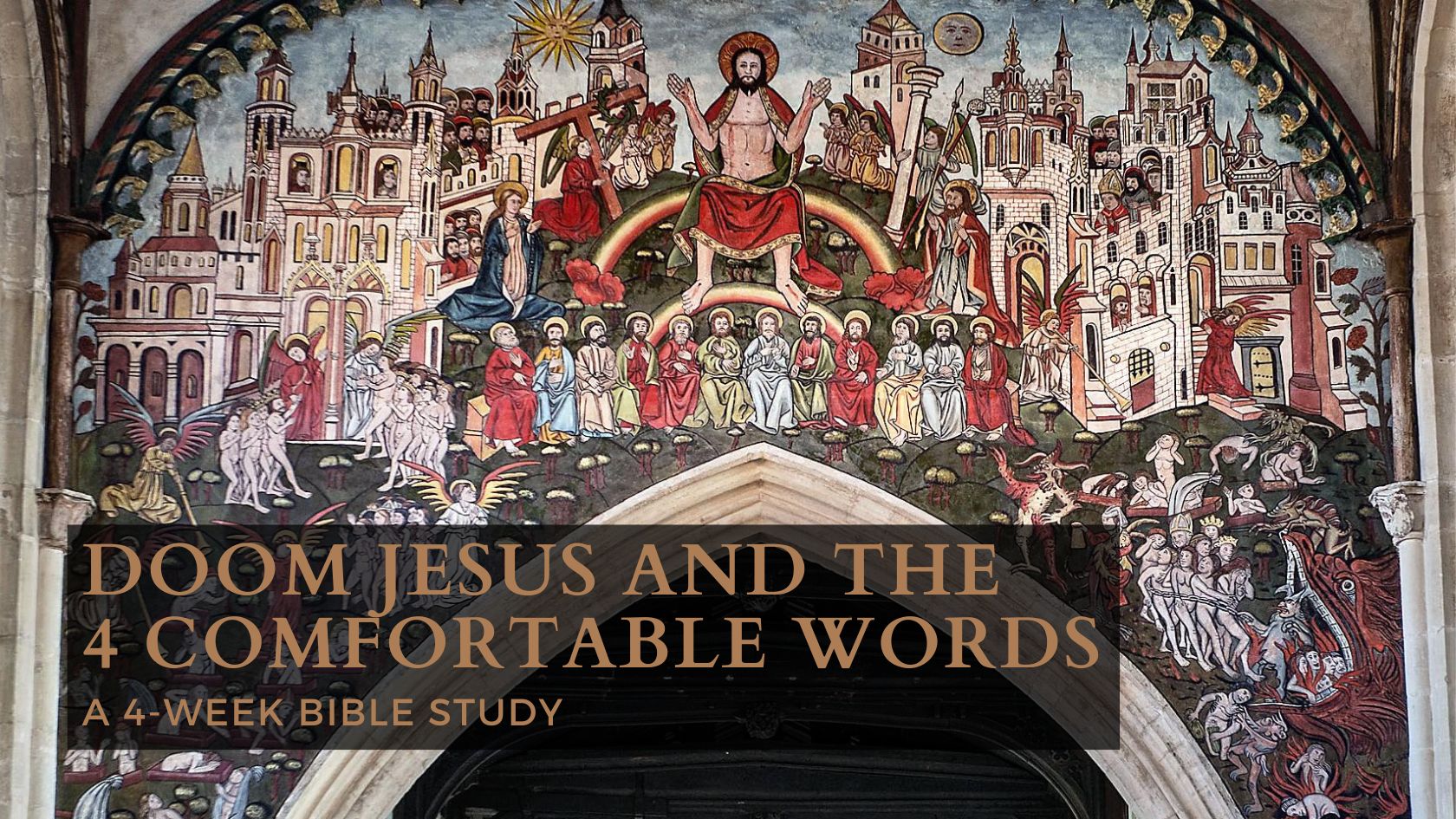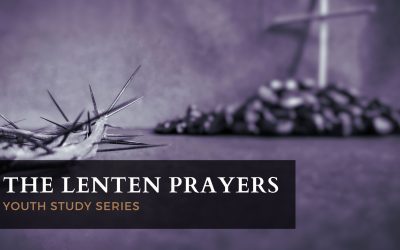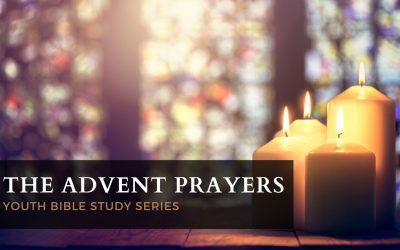There’s no question that the medieval church was less than perfect. The people didn’t have bibles in their own language, and attended mass spoken entirely in Latin. So they relied heavily on the explanations they got from greedy and power-hungry clergy and what they could see in the paintings and stained glass of their churches.
Payment for forgiveness of sin (and other sacraments) was common, and a means of control for the church over the people.
During these times, paintings in churches depicting Jesus as a harsh judge become commonplace. Many of them show Jesus casting judgement on the people, allowing some into Heaven and condemning others into the the pits of Hell. These paintings, now referred to as doom paintings, were likely done in the churches as a reminder to the people that they better get in line, or they’ll suffer the same fate as the ones being cast into eternal torture.
This “Doom Jesus” is not the loving, compassionate Jesus that we see throughout the Scriptures. Yes, there is an eternity in Hell for those who choose not to accept Jesus and His forgiveness. But, His love and forgiveness is there for everyone. His heart is that no one would perish and suffer that horrible fate.
The English Reformation and Thomas Cranmer’s Response
The Reformation of the church happened largely in response to this kind of abusive and controlling culture that had taken over in the church. The bible was getting translated into the language of the people, and many other reforms were taking place to bring the heart of the Gospel back to the forefront.
As the Church of England was establishing, Thomas Cranmer (Archbishop of Canterbury) began to develop the Book of Common Prayer. In the liturgy, Cranmer wrote in four bible verses that bring proper perspective to this “Doom Jesus” mentality that the people had ingrained in them. These passages are referred to as the 4 Comfortable Words (BCP p. 332).
Today, these four passages are read during the Rite 1 liturgy, immediately after the Confession of Sin (and absolution). So the flow is that we (the people) recognize and confess how we’ve fallen short, then the priest passes on the forgiveness of those sins, and then we hear these four passages to remind us exactly who Jesus is.
In our youth group study, we spent one week each studying these four passages to really understand what they mean, and help paint a better picture of who Jesus is (and what His heart if for us).
The First Comfortable Word: Matthew 11:28
“Come unto me, all ye that travail and are heavy laden, and I will refresh you.” — Matthew 11:28
The Comfortable Words seem to start with an invitation. “Come,” Jesus says to us. Immediately contradicting the idea that He’s sending or condemning any of us to Hell. Rather, He tells us something like, “Hey, I know you’re carrying some heavy stuff. I want to take care of that for you.”
The words travail and heavy laden describe a condition of growing weary, tired, or exhausted, and to overload with a heavy burden. While this describes really all of us, the youth are no exception. They carry burdens today that many generations before them couldn’t have imagined. And the rates of (clinical) depression and teenage suicide are at all-time highs as a result of it. Not to mention that we often tend to stigmatize or downplay mental health issues, making it even more difficult for youth to deal with.
But (I believe) the best part of this passage isn’t even that it’s an invitation for all who are carrying the weight of life, but it’s in Jesus’ promise in what he’ll do with it as we bring it to him and lay it down. He will refresh us. The Greek word here is anapauo, which means, “to cause or permit one to cease from any movement or labor in order to recover and collect his/her strength.”
It’s not enough to Jesus that we’re able to just drop the weight. He wants to restore us to full strength. He wants a complete recovery.
The Second Comfortable Word: John 3:16
“God so loved the world, that he gave his only-begotten Son, to the end that all that believe in him should not perish, but have everlasting life.” — John 3:16
This is arguably the most popular verse in the Bible, and for good reason. It summarizes the entire Gospel message incredibly well.
And while we could talk a lot about things like God’s “agape” love, the meaning of the “world” (the Universe, the entirety of the human family), and that the only requirement being that we just believe in Him, the biggest things that stood out as we discuss this passage with the youth are two terms… perish and life.
The word perish carries the idea of being destroyed and rendered useless. So there’s this idea that not accepting this free gift means that we’re choosing a lack of meaning and purpose and usefulness. This speaks heavily into our core identity. Fortunately, believing in Him means that this won’t happen, and that we get to experience the alternative.
And that alternative is this work life. The Greek word here is zoe, which speaks more of the absolute fullness of life, both essential and ethical. And the best part is that this kind of life is described as everlasting, something that has always been and always will be. This is something that we get to possess just because we believe.
The choice is ours to make. We can chose a life rendered useless, or the absolute fullness of life. It’s not something that we’re condemned to. The door is open, should we chose to walk through it.
The Third Comfortable Word: 1 Timothy 1:15
“This is a true saying, and worthy of all men to be received, that Christ Jesus came into the world to save sinners.” — 1 Timothy 1:15
This passage (in our discussion on it) comes in two parts. The first part is about it being a true saying, and that it’s worthy of all men. On that first point, it’s pretty cool to think that this was a saying! It gets to the idea that people are out there saying things regularly, and this was one of them. So Paul recognizes that this saying is an important and true one. And he goes so far as to say that it’s something worthwhile for all people to hear. This idea of nobody being excluded is a theme that we’ve already seen through these passages, and is reinforced here. There are no exceptions with who is included in this.
The second part is the saying itself, “that Christ Jesus came into the world to save sinners.” The first big point in this saying is that Jesus came. It’s not something He was forced to do. It wasn’t a punishment. God Himself came to us in the human form of Jesus for an important reason. This speaks of the relentless pursuit we see in God from the very beginning. In our studies of the Old Testament, we see God pursue relationship with us, we spit in His face and walk away, and He continues to pursue us. So when we see this here in the life of Jesus, it brings comfort knowing that He wants us to be with Him so badly.
The other big idea in this saying is that it was to save sinners. This is an important detail, because it’s not just a, “He came for everyone,” statement. He came to save us while we are in our sin. We see in the Catechism (BCP p. 848) that the definition of sin is basically choosing ourselves first (self-contentedness), which destroys our relationship with God, other people, and all of creation. So in our selfish behavior, when we don’t care about anyone except ourselves, God came to save us from the consequences of our own self-destruction. It doesn’t matter what we’ve done. God loves us, and pursues us anyway, whether we feel like we deserve it or not.
That’s a powerful love. And it’s important for us to recognize that even in our lowest moments, He’s still there.
The Fourth Comfortable Word: 1 John 2:1-2
“If any man sin, we have an Advocate with the Father, Jesus Christ the righteous; and he is the perfect offering for our sins, and not for ours only, but for the sins of the whole world.” — 1 John 2:1-2
This is another passage that’s full of ideas that we could unpack. But in our study there are two big ideas that stood out. However, it’s worth noting that the theme of all people, even in our sin, is one that continues strong through this passage too. This is important for our youth today, who are often quick to disqualify themselves for being worthy of certain things. So to see this line of thought continue through this passage helps them see that they are, in fact, the very ones that the passage is talking about.
With that said, the first big idea in here is that Jesus is our advocate. This carries some heavy courtroom vibes. It’s as if we’ve been (rightly) brought before the Judge for our crimes, and while we’re likely there trying to defend ourselves, here comes Jesus saying, “Hold on, I’ve got this one.” Jesus stands up and makes the case for us. This is a very different picture than the Doom Jesus directing some into Hell. It’s as if Jesus is saying to each one of us, “Listen, I want you here, so I’m talking to the Judge and letting Him know that I’ve already taken care of your penalty. So just relax, and let me represent you.”
And the other cool thing that stands out in here is that the passage calls our defense attorney not just Jesus Christ, but this is “Jesus Christ the Righteous.” The additional description of who He is adds to the intensity of who it is that’s defending us. It’s kind of like the difference between talking about a man named “Bob,” and a man called “Bob the Builder.” The name by itself doesn’t tell you much about the man. But when you know he’s a builder, then you know some things about him. In the same way, calling Jesus “the righteous” tells us that it’s not just the man defending us. This is the One who has nothing wrong with him. When He speaks, it’s with the authority that comes with His perfection. That’s certainly going to carry some weight with the Judge.
Final Thoughts on Doom Jesus and the 4 Comfortable Words
This look at the 4 Comfortable Words with the youth has brought some incredible perspective on who Jesus is and what he thinks about us. It’s helped the youth see value in themselves, and meaning in their relationship with Christ.
Most of them would admit that there’s at least an element of looking at God as this ruling authority who wants us to live a certain way, and if we mess up in anyway, then maybe he’ll love us less. But that couldn’t be further from the truth!
We go back to where these passages are read during the Rite 1 liturgy, and it comes after the confession of sin, and the absolution. It’s almost a recognition that, “Okay, so you messed up. You’re forgiven. Now let me remind you about how deeply Jesus love you and what he’s done for you. You are important to Him, and He’ll go as far as it takes to make sure you’re okay.”
For a generation that’s carrying so much junk and dealing with self-esteem issues and struggling to figure out where they fit in, these 4 Comfortable Words bring grounding and peace. And I pray that they experience this love in deep and meaningful ways.
May they (and we) never forget these truths.




